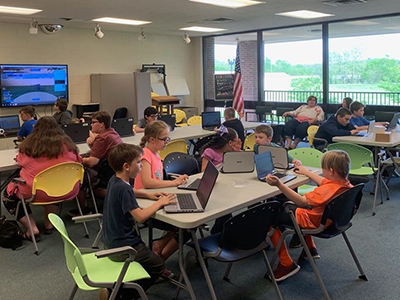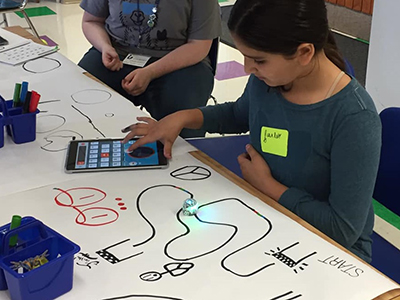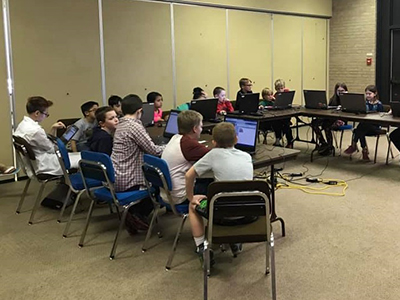“I want every kid to have the chance to program a robot, to unleash their creativity and collaborate on projects that inspire them, and to develop the confidence they need to substantively engage with the problems they see around them through the power of code.”
– Eric Stroshane, Library Development Manager, North Dakota State Library

As access to computers has increased and learning to code has emerged as a critical skill, youth in rural communities are at risk of being left behind. That's something the North Dakota State Library, with funding from IMLS, has taken note of—and is tackling head-on. In 2018, the North Dakota State Library received a National Leadership Grant for Libraries for a project called Coding at Every Library to demonstrate the viability and impact of library-based Code Clubs in small and rural communities all across the country.
Initiatives in the library field in recent years have worked to expand access to computer programming education. However, many of these are focused on urban and suburban settings, or aren't tailored to meet the unique needs of small and rural libraries. Even when programs are available to rural communities, potential constraints on the staff and resources of small and rural libraries are a factor that can limit widespread adoption. But the North Dakota State Library had been offering CodeDak’s Hour of Code program for a few years, and after seeing the results of this effort firsthand, the team knew that with some help, they could assist other rural libraries with offering the same code learning services to their communities.
The North Dakota State Library and its partners—Prenda and the Association for Rural and Small Libraries—are able to leverage their collective expertise and pre-existing computer science education platform, which specializes in supporting non-expert facilitators, to work closely with other rural communities. Over the course of two years, Coding at Every Library will support weekly Code Clubs at 100 small and rural public libraries across America, helping an estimated 10,000 young people learn coding while creating resources and a practitioner community to enable many more libraries to offer coding programs.
Life Skills, Gamified

Code Club is designed to teach children computer programming skills and provide them with valuable life skills like computational thinking and problem solving, as well as future career opportunities.
Once a week, each library welcomes kids aged 8 to 14 years old who are learning the basics of computer coding languages, and together, they work on creating games, music, animation, or websites. Young coders have access to various coding programs and can choose what they want to learn and work on.
“Kids who otherwise wouldn’t have the opportunity are learning how to code through Code Club in their library once a week,” said Luke Miller, head of Code Club at Prenda. “They’re learning valuable life skills that will serve them regardless of their future job, and at the same time they’re learning a highly marketable job skill."
The program itself functions like a game. Club members have an account, create an avatar, can unlock gear for their character by completing coding tasks, and using their new skills to do more complicated missions either individually or collaboratively. Since the program is self-paced, new members can join at any time, and more experienced members can help beginners. The schedule, too, is flexible: members aren't required to attend every week, and can drop in when they're able.
Local Impact, Nationwide
As of November 2019, an initial grant group of 50 libraries across the country saw a total of 1,886 kids participate, attending Code Club meetings a combined 8,410 times. The students logged in an additional 3,544 times from home, completed a combined 4,569 coding activities and projects, and clocked 7,349 hours of coding.
The Code Club at Jaffrey Public Library in New Hampshire, one of the first 50 grant recipients, implemented its program in the fall of 2018. It's since become so popular that the library hosts an average of 40 kids each week. Library Director Julie Perrin says that they're planning on making their programming "bigger and better" this summer by expanding science, technology, engineering, arts, and math—or STEAM—activities, and including opportunities for younger children. With help from an additional grant, the library has been able to hire a new assistant to administer the STEAM programming and purchased equipment, including a wall screen and additional laptops and iPads. With the new technology, their Code Club will be able to move out of the library’s computer room to a more spacious area.
Meanwhile, at New Town City Library in North Dakota, Code Club had a larger impact on their community than anyone ever expected. Library Director Julie Herbel was initially met with resistance when she started the New Town Code Club. However, within two weeks of initiation, the club had grown to eight children, and by July, there were 25 participants who had tried coding and were coming back for more. But with only 1,000 square feet of library space, New Town City Library had only four computers and three laptops, hardly enough for 25 weekly coders.
New Town City Council members were interested in learning more about the program. Children and parents visited with the board members, and the board members took turns stopping by the library to see how the children were applying the coding they were learning. And just four months after the program's launch, the city council bought the library a brand new 3,800-square-foot building. There was just one condition—one room had to be designated for Code Club, and that room was going to have new computers.
Creating a Community of Collaborators

It's not just kids who are benefitting: by the end of two years, the project will have helped 100 library staff members develop the confidence and capacity to support Code Clubs. “Many library staff are apprehensive about leading a coding program because they do not have the expertise they think is required,” said Eric Stroshane, Library Development Manager at North Dakota State Library. “They struggle to find time to prepare lessons, and don’t know how to build community partnerships in order to connect with experts that may help them build successful coding activities.”
So Stroshane and his team are on hand to work with library staff across the country at every step in the process. “It’s daunting to facilitate a Code Club without an IT background, especially when you work alone,” said Stroshane. “By building an online community, creating and sharing resources, providing coaching, facilitating peer-to-peer mentorship opportunities, and granting access to Prenda’s low-cost and high-impact coding environment, we’re not just demonstrating what’s possible at small and rural libraries, we’re creating a roadmap we hope others will follow.”
Through their National Leadership Grant funds, the North Dakota State Library was able to work with Prenda to expand their online library of resources for rural libraries to include a guide on running a successful Code Club and a sample digital marketing plan, including pre-written emails, social media posts, a promo video, and graphics that grantees can use. Other available resources include The Volunteer Recruitment Guide, which helps libraries recruit and train parents, college students, or other volunteers on how to help out with Code Club, and The Quick Guide to Building a Core Group, which helps librarians think about how to build a core group of coders who show up every week.
Most importantly for small libraries with limited equipment, Stroshane worked with current grantees to develop a Sharing Computers guide to help librarians run Code Club when they don’t have enough computers for every kid to have their own, as this is a common problem for many of their grantees. To make sharing knowledge and materials easier, the team also established a Facebook community for all grantees, where club facilitators can access resources, share successes, and get answers to some of their challenges.
What's Next: Beyond the Grant
One of the central themes of the project is libraries' essential role in communities. By offering coding programs, small and rural libraries have additional ways to serve as community anchors, creating a safe environment for youth to develop skills that will build confidence and prepare them for success. But what happens when the end of the grant's timeline approaches? The initial 50 grants still have a couple of months left, and an additional 50 libraries will initiate Code Clubs beginning in January and February of this year.
As the end of their grant period approaches, Stroshane and his staff work with participating libraries to secure additional grants or funding to keep their Code Clubs running. And library staff who have undergone training now have the capacity to extend the impact of Code Club beyond the funding period, thanks to the support, education, and resources gained along the way.
For kids, families, librarians, and communities, coding can make a world of difference—and hopefully, these 100 small-but-mighty libraries across the country are just the beginning.
About the Project
Grant Project Name: Coding at Every Library
Project Detail: lg-95-18-0024-18
Year Awarded: 2018
Recipient: North Dakota State Library
Project Contact:
Eric Stroshane, Project Director
estroshane@nd.gov
(701) 328-4661
Website: www.hclib.org